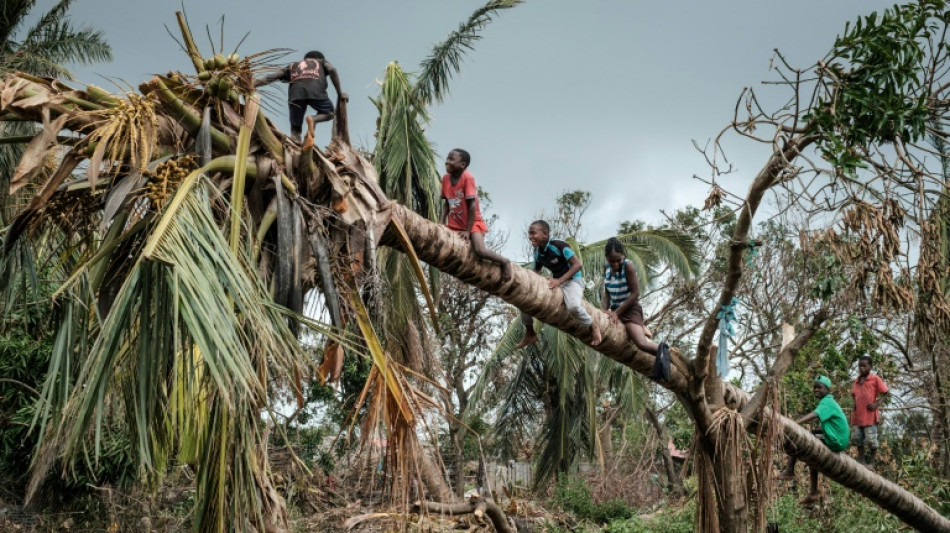
-
 US military assets in the Middle East
US military assets in the Middle East
-
Neymar hints at possible retirement after World Cup

-
 Stocks rise after court ruling against US tariffs
Stocks rise after court ruling against US tariffs
-
Australia end dismal T20 World Cup by thrashing Oman

-
 Olympics chief says Milan-Cortina has set new path for Games
Olympics chief says Milan-Cortina has set new path for Games
-
Russian SVR spy agency took over Wagner 'influence' ops in Africa: report

-
 Pegula fights back to sink Anisimova and reach Dubai final
Pegula fights back to sink Anisimova and reach Dubai final
-
Trump administration denounces 'terrorism' in France after activist's killing

-
 Colombia's Medellin builds mega-prison inspired by El Salvador's CECOT
Colombia's Medellin builds mega-prison inspired by El Salvador's CECOT
-
German broadcaster recalls correspondent over AI-generated images

-
 US Supreme Court strikes down swath of Trump global tariffs
US Supreme Court strikes down swath of Trump global tariffs
-
England's Itoje says managing 'emotional turmoil' key to 100 cap landmark

-
 Trump says weighing strike on Iran as Tehran says draft deal coming soon
Trump says weighing strike on Iran as Tehran says draft deal coming soon
-
Tudor is '100 percent' certain of saving Spurs from relegation

-
 Azam dropped for scoring too slowly, says Pakistan coach Hesson
Azam dropped for scoring too slowly, says Pakistan coach Hesson
-
Stocks volatile after soft US growth data, court ruling against tariffs

-
 Italy bring back Capuozzo for France Six Nations trip
Italy bring back Capuozzo for France Six Nations trip
-
From Malinin's collapse to Liu's triumph: Top Olympic figure skating moments

-
 Arteta urges Arsenal to 'write own destiny' after title wobble
Arteta urges Arsenal to 'write own destiny' after title wobble
-
Ukraine Paralympics team to boycott opening ceremony over Russian flag decision

-
 Wales captain Lake wants fans to bring 'noise' against Scotland
Wales captain Lake wants fans to bring 'noise' against Scotland
-
Skier Vonn's Italian hospital a hotbed of men, sister says

-
 India target S.Africa top order, Abhishek to come good: bowling coach
India target S.Africa top order, Abhishek to come good: bowling coach
-
Carrick praises Man Utd 'diversity' after Ratcliffe's immigrant rant

-
 I never thought it would be hit, says 'Scream' creator 30 years later
I never thought it would be hit, says 'Scream' creator 30 years later
-
AI summit statement delayed to 'maximise' signatories: India

-
 Barcelona's Sagrada Familia basilica hits peak height
Barcelona's Sagrada Familia basilica hits peak height
-
Milan sprints to second straight UAE stage win as Tiberi keeps lead

-
 US GDP growth misses expectations as Trump blames shutdown
US GDP growth misses expectations as Trump blames shutdown
-
Benfica investigate video of fans' monkey gestures

-
 French minister pledges tight security at rally for killed activist
French minister pledges tight security at rally for killed activist
-
Guardiola 'couldn't care less' about Arsenal stumble in title race

-
 UK police search property as royals reel from Andrew's arrest
UK police search property as royals reel from Andrew's arrest
-
Germany's Merz to visit China next week

-
 Kompany says Mourinho made 'huge mistake' in Vinicius racism row
Kompany says Mourinho made 'huge mistake' in Vinicius racism row
-
X appeals EU's 120-mn-euro fine over digital content violations

-
 Galthie recalls hulking locks Flament, Meafou for Italy
Galthie recalls hulking locks Flament, Meafou for Italy
-
Turkey, Saudi sign major solar power deal

-
 US Olympic freeskier Hess embraces 'loser' tag after Trump blast
US Olympic freeskier Hess embraces 'loser' tag after Trump blast
-
European stocks rebound, oil prices ease after US-Iran volatility

-
 'Alpha male' AI world shuts out women: computing prof Hall
'Alpha male' AI world shuts out women: computing prof Hall
-
New Zealand freestyle skier Ives in hard Olympic crash

-
 New Zealand must adapt quickly to Sri Lanka wickets: Chapman
New Zealand must adapt quickly to Sri Lanka wickets: Chapman
-
Thai activist's jail term for royal insult extended to 30 years

-
 Families of Duterte's drug war victims eye Hague hearing with hope
Families of Duterte's drug war victims eye Hague hearing with hope
-
India chases 'DeepSeek moment' with homegrown AI

-
 UN touts panel for 'human control' of AI at global summit
UN touts panel for 'human control' of AI at global summit
-
Ukraine Paralympics team to boycott Opening Ceremony over Russian flag decision: statement

-
 UK monarchy reels from Andrew's stunning arrest
UK monarchy reels from Andrew's stunning arrest
-
Somaliland, where Muslims love Israel


Mozambique cyclone cluster raises fears of new norm
Three cyclones have battered Mozambique in three months, pounding one of the world's most impoverished regions, pushing thousands of people into distress and leaving experts wondering whether more frequent storms will become the norm.
The unusually clustered series of cyclones has also piled pressure on aid groups assisting people in the area, where the repeated disasters have destroyed tens of thousands of homes.
"Mozambique is experiencing a truly bad series of cyclonic impacts," said Sebastien Langlade, chief cyclone forecaster at the Regional Specialized Meteorological Centre based on Reunion island in the Indian Ocean.
The first of this cyclone season -- which typically runs from November to after April -- was Chido which struck in mid-December, killing at least 120 people after tearing through the French territory of Mayotte.
Dikeledi made landfall in January, claiming at least five lives.
And then came Jude, which last week brought winds of up to 195 kilometres (120 miles) an hour, according to Mozambican authorities. It killed at least 16 people in the country and destroyed more than 40,000 homes.
It affected around 420,000 people across Madagascar, Malawi and Mozambique, the UN has said.
Jude and Dikeledi made landfall at almost the same location in the province of Nampula, about 1,400 kilometres (870 miles) north of the capital Maputo. Chido hit about 200 kilometres further north.
- Repeat disasters -
"It's double tragedy. These are communities that did not have an opportunity to recover from the first cyclone," the head of the Red Cross and Red Crescent delegation in Maputo, Naemi Heita, told AFP.
The impoverished and remote area is home to some of the most vulnerable people in the world, "who are just not well set-up to withstand these kind of impacts," UNICEF's Mozambique spokesperson Guy Taylor said.
By the time Jude arrived, "all river basins and dams in Nampula province were already almost full," said Taylor.
The recurring disasters are also putting strain on the capacity of international aid organisations to respond.
"Supplies become depleted -- after one cyclone, two cyclones, three cyclones, you start to run out," said Taylor.
While the extreme weather is leaving these regions increasingly vulnerable, there is no matching rise in resources available to help them, said Heita.
"We are definitely concerned about the increase of the disasters, the intensity as well as the frequency. And that has made us realise that we need to invest more into preparedness," she said.
- Increased frequency -
This part of central Mozambique has experienced some terrifying storms, including Idai which claimed more than 600 lives in 2019.
Even if the number of people killed in this season's cyclones was lower than some previous ones, experts are seeing an increase in frequency.
Mozambique has been struck by eight cyclones since 2019, said Langlade. "This is unprecedented in the cyclonic history of the country," said the meteorologist who has catalogued all weather systems that affected the area since satellites were first used in 1969.
Previously there were between six and seven such events -- cyclones as well as tropical storms -- a decade, he said. But in the previous six seasons, there had already been 10, he added.
A factor may be the warming of the waters in the Mozambique channel between Madagascar and Africa, with warmer seas among the elements that fuel cyclones, he said.
For the whole of the southwestern Indian Ocean area, eight of the 11 recorded tropical storms this season reached cyclone intensity, the expert said.
"This ratio is above normal. Typically, it is 50 percent, but so far it has exceeded 70 percent," he said.
"Is this simply a natural long-term fluctuation or is it a response to climate change? It's still too early to tell."
"Adaptation is necessary," said Taylor. UNICEF has, for example, built more than 1,000 classrooms in Mozambique that can stand up to cyclones.
Preparedness also saves lives, he said. "It really makes the case for investing in resilience, because if you don't, it's almost like not having infrastructure in some of these places, because it just gets knocked down time and time again."
P.Costa--AMWN


